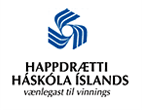Question
Why are people in Iceland not named after fish like Bleikja (arctic char) or Urriði (trout)?
Asked By
Arnar Hinriksson
Answer
The custom of giving people names from natural phenomena, particularly from the animal kingdom, is ancient, maybe going all the way back to the Indo-European origins of the language. Words like this appear in old Icelandic sources, many still being used today, with quite a number having been added during the last decades. Most are compound names where either a suffix or prefix is an animal name, e.g. Bjarndís (Bjarn=bear), Hrafnkell (Hrafn=raven), Hallbjörn (björn=bear), Björgúlfur (úlfur=wolf) Sometimes both segments of a compound name originate from the animal kingdom e.g. Örnólfur (Örn=eagle), (-ólfur=wolf), Arnbjörn (Arn=eagle) (björn=bear). Nouns that are not compounded are also common, like Hrefna (minke whale) and Björn (bear).
It is thought that in ancient times the giving of an animal name implied the wish that the bearer would have special attributes, like strength or daring. This is why names originating from "bear", "wolf" and "eagle" are common. The Icelandic National Population Registry shows that names originating from the animal kingdom have greatly increased from medieval times, both compound and simple names. Women's names originating from the animal kingdom are fewer than corresponding men's names, and they tend to be bird names e.g. Arna (eagle), Dúfa (dove), Erla (wagtail), Hrefna (minke whale) , Lóa (plover), Svala (swallow), Hrafnkatla (raven), Svanhvít (swan) Few originate from mammals, wild or domesticated. There is no woman's name that originates from a fish, which was also the case in medieval times. Most men's names originate from the names of wild mammals, e.g. Bessi (bear), Björn (bear), Hjörtur (stag), Húnn (bear cub), Kópur (seal cub), Mörður (weasel), Bjarnþór (bear), Vébjörn (bear), Björgúlfur (wolf). Quite a few also originate from bird names, e.g. Ari (male eagle), Gaukur (cuckoo), Hrafn (raven), Orri (grouse), Smyrill (merlin), Arngeir (eagle), Hrafnkell (raven), Svanbjörn (swan - bear). There are very few names originating from fish. But in older language the names Karfi (carp) and Hængur (male salmon/trout) were common, but today, only the latter name can be found in the National Population Registry. The only names originating from invertebrates are Ormar (worm) and Ormur (worm). Many names originating from the animal kingdom that occurred in older language have not survived in modern usage. Some only occur in medieval sources, e.g. Rjúpa (ptarmigan), Grís (piglet), Hafur (billy goat), Lambi (lamb), Refur (fox). Some of these names survived for centuries, e.g. Kálfur (calf), but have now disappeared. It is not always easy to ascertain why one name survives throughout the centuries, while another is forgotten. Sometimes it can be explained by the fact that some of the names can be used about people in a negative context, e.g. that someone is a refur (fox) in business, a dirty/mischievous grís (piglet) or an absolute kálfur (calf). Not many names of domesticated animals have become popular, possibly because many of them are too closely related to daily tasks. Ær (ewe), Hross (horse), Kálfur (calf) are names that exist but are unlikely choices. The same can be said about fish names. Words like Þorskur (cod), Ýsa (haddock), Lúða (halibut), Karfi (carp), Síld (herring) are no worse than many other names being used, but they are too close to daily tasks to get a positive reaction from someone looking for a name. Translated by Paul Richardson. Image: HB
Um þessa spurningu
Dagsetning
Published20.1.2006
Category:
Citation
Guðrún Kvaran. „Why are people in Iceland not named after fish like Bleikja (arctic char) or Urriði (trout)?“. The Icelandic Web of Science 20.1.2006. http://why.is/svar.php?id=5579. (Skoðað 3.4.2025).
Author
Guðrún Kvaranprofessor



